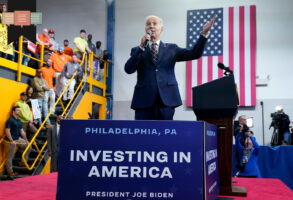
Published January 16, 2015
In the most recent issue of National Review, Henry Olsen, my Ethics and Public Policy Center colleague, takes possible GOP presidential contender Jeb Bush to task for embracing what he sees as an uninspiring economic agenda. This, Olsen contends, is a recipe for losing the presidential election again in 2016.
Olsen’s critique is premature, because Governor Bush hasn’t outlined an economic agenda — not yet. What Olsen cites is a Bush fundraising letter to conservative Iowa voters, written in October of last year, in which he provided the barest of outlines of an economic agenda wrapped in a lengthy plea for support of the governor’s educational-reform efforts. Olsen contends that this fundraising letter shows Bush is inclined toward embracing “the establishment’s domestic priorities,” including “cutting entitlements such as Social Security and Medicare.” But the Bush letter never mentions Social Security or Medicare, much less “cutting” them. What the letter does say is that entitlement reform is necessary to prevent spending from rising well beyond what is affordable for America’s taxpayers. A string of long-term forecasts from the Congressional Budget Office makes clear that this is a fact, not an ideological assertion.
But despite being too quick out of the gate with his “Bush-will-lose-like-Romney” critique, Olsen does have a point. A successful GOP candidate for president in 2016 must win several critical swing states — such as Florida, Ohio, Wisconsin, Virginia, and Colorado — that Mitt Romney contested but lost in 2012. Moving these states from the Democratic to the Republican column will mean appealing to working-class households and independents who voted for President Obama in 2012, and who are not predisposed to a traditional GOP agenda of tax cuts and spending restraint.
This will be a difficult challenge. The GOP candidate must provide some contrast with prevailing Democratic economic policy, and that means embracing a reform agenda of some dimension. Moreover, any honest assessment of the nation’s pressing challenges would point to a dysfunctional tax code that is stifling growth, as well as a long-term budget trend toward consumption-oriented entitlement spending that is crowding out public and private productive investments in the nation’s future and pushing aside critical national-security commitments. But in embracing an aggressive economic-reform agenda, the Republican presidential candidate must not alienate working-class voters who have seen very little income growth over the past 15 years and are not now convinced that a “free market” is the full and complete answer to their problems.
So what’s a GOP presidential candidate to do?
Here it’s worth revisiting what Jeb Bush’s older brother did to broaden the appeal of the party’s economic agenda when he first ran for president at the end of a two-term Democratic administration in 2000.
Then-governor George W. Bush chose as one of his signature campaign themes “compassionate conservatism.” It had two purposes: It was intended to provide the starting point for an actual governing philosophy in domestic affairs, but its first aim was clearly political. It took the electoral tightrope that successful GOP presidential candidates must walk to win and turned it into a campaign slogan. The phrase first signaled to the party’s core supporters that Governor Bush was a conservative reformer, determined to promote stronger growth with the right kind of tax and fiscal policy. Importantly, Bush made a point in both 2000 and 2004 of saying that Social Security and Medicare were in need of reform, to preserve them for future generations and head off damaging tax increases. But he did so while also signaling that he believed in the goals of those programs and, further, that he believed in a strong safety net — and had ideas for how it could be improved for vulnerable and modest-income Americans.
The “compassionate conservatism” slogan did not sit well with all traditional GOP supporters and party elites. Some found it off-putting that a Republican candidate would imply that a conservative economic agenda wasn’t, by itself, “compassionate.” Others objected to the perception that the Bush campaign was trying to create some political space between itself and the Reagan agenda that had dominated GOP thinking for two decades.
The slogan also proved less useful for governance than for politics, in large part because it meant different things to different people, even among those serving at the highest levels of the Bush administration. To some, compassionate conservatism meant coupling a tax-and-spending-reform agenda with a relatively small number of targeted efforts to help low-income households break the cycle of poverty, especially with initiatives sponsored by religiously affiliated organizations. To others, the slogan was meant to convey a broader philosophical approach to the welfare state, balancing a desire for reform with an understanding that reform couldn’t go too far too fast. In the end, the Bush administration approached economic-policy decisions with an orientation that did not differ all that much from the approaches taken by President Reagan and Bush’s father. In practice, that meant pursuing reform, but with an appreciation for the very powerful political forces that make the welfare state so impervious to change.
And that’s the point that prospective 2016 presidential candidates must fully absorb. No candidate should adopt “compassionate conservatism” as his campaign theme; it has too much baggage at this point to be effective. But to be successful, candidates must find some way to convey to voters an approach to reforming the welfare state that working-class voters and independents find acceptable. There’s room in such an approach for a critique of the excesses of an entitlement culture that impedes growth and opportunity and undermines work incentives. But there’s also a mountain of electoral evidence that a critical mass of voters (many located in must-win states) will only support a candidate whom they view as attentive to individuals and families that rely on government assistance for their economic security, and who offers them solutions and reforms that do not undermine that security. The successful conservative candidate in 2016 will find language that allows him to walk this political tightrope, as other successful GOP candidates have done in the past.
— James C. Capretta is a senior fellow at the Ethics and Public Policy Center and a visiting fellow at the American Enterprise Institute.



